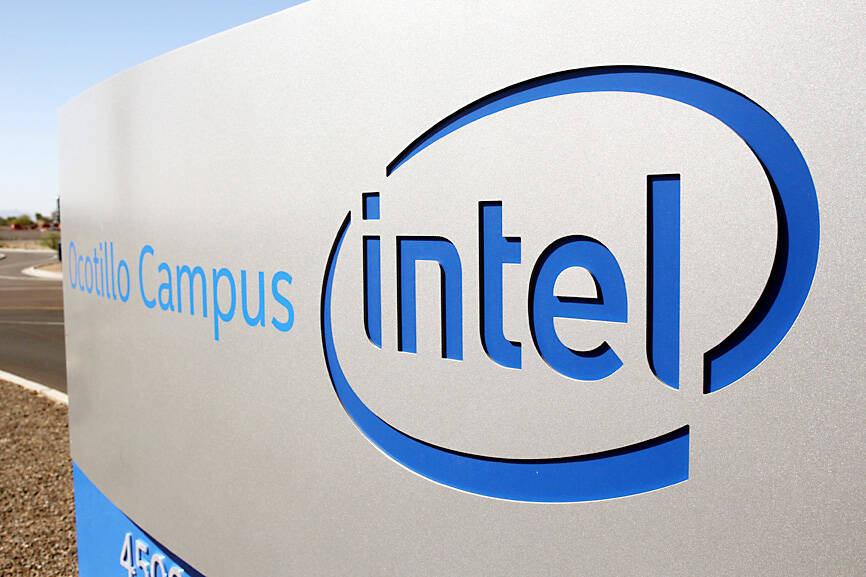Intel Corp has started evaluating a handful of outsiders, including former board member Tan Lip-bu (陳立武), for the role of chief executive after the struggling US chipmaking icon ousted company veteran Pat Gelsinger, according to people familiar with the matter.
Tan, a well-respected semiconductor industry veteran who has long been seen as a contender for CEO at Intel, has been approached by Intel’s board in recent days to gauge his interest in taking up the job, the sources said.
Intel’s board is mostly evaluating outsider candidates for the role and has also approached Marvell Technology Group Ltd CEO Matt Murphy, two of the sources said.

Photo: REUTERS
The deliberations on the CEO succession are at an early stage, the sources said, cautioning that Intel has not yet zeroed in on any candidate to replace Gelsinger, who stepped down from his role on Monday after being given the choice to retire or be removed.
The board has formed a search committee for Gelsinger’s successor and is expected to make a final decision on his replacement in the coming months, the sources said.
The company on Monday named chief financial officer David Zinsner and senior executive Michelle Johnston Holthaus as interim co-CEOs.
Intel declined to comment. Representatives for Tan’s venture capital firm, Walden Catalyst Management LLC, did not respond to a request for comment.
The hunt for Intel’s next leader is one of the most closely watched CEO successions in the US and comes at a pivotal time for the ailing chipmaker, which is enduring one of the bleakest periods in its five-decade history.
Intel’s revenue shriveled to US$54 billion last year, down nearly one-third from the year Gelsinger took over as CEO in 2021. Analysts expect Intel to lose US$3.68 billion this year, its first annual net loss since 1986.
The company’s shares were down nearly 6 percent on Tuesday, off more than 60 percent from a peak hit in Gelsinger’s first months as CEO. The crash in Intel’s share price had sparked takeover interest from suitors such as Qualcomm Inc, Reuters has reported.

When an apartment comes up for rent in Germany’s big cities, hundreds of prospective tenants often queue down the street to view it, but the acute shortage of affordable housing is getting scant attention ahead of today’s snap general election. “Housing is one of the main problems for people, but nobody talks about it, nobody takes it seriously,” said Andreas Ibel, president of Build Europe, an association representing housing developers. Migration and the sluggish economy top the list of voters’ concerns, but analysts say housing policy fails to break through as returns on investment take time to register, making the

‘SILVER LINING’: Although the news caused TSMC to fall on the local market, an analyst said that as tariffs are not set to go into effect until April, there is still time for negotiations US President Donald Trump on Tuesday said that he would likely impose tariffs on semiconductor, automobile and pharmaceutical imports of about 25 percent, with an announcement coming as soon as April 2 in a move that would represent a dramatic widening of the US leader’s trade war. “I probably will tell you that on April 2, but it’ll be in the neighborhood of 25 percent,” Trump told reporters at his Mar-a-Lago club when asked about his plan for auto tariffs. Asked about similar levies on pharmaceutical drugs and semiconductors, the president said that “it’ll be 25 percent and higher, and it’ll

CHIP BOOM: Revenue for the semiconductor industry is set to reach US$1 trillion by 2032, opening up opportunities for the chip pacakging and testing company, it said ASE Technology Holding Co (日月光投控), the world’s largest provider of outsourced semiconductor assembly and test (OSAT) services, yesterday launched a new advanced manufacturing facility in Penang, Malaysia, aiming to meet growing demand for emerging technologies such as generative artificial intelligence (AI) applications. The US$300 million facility is a critical step in expanding ASE’s global footprint, offering an alternative for customers from the US, Europe, Japan, South Korea and China to assemble and test chips outside of Taiwan amid efforts to diversify supply chains. The plant, the company’s fifth in Malaysia, is part of a strategic expansion plan that would more than triple

Taiwanese artificial intelligence (AI) server makers are expected to make major investments in Texas in May after US President Donald Trump’s first 100 days in office and amid his rising tariff threats, Taiwan Electrical and Electronic Manufacturers’ Association (TEEMA, 台灣電子電機公會) chairman Richard Lee (李詩欽) said yesterday. The association led a delegation of seven AI server manufacturers to Washington, as well as the US states of California, Texas and New Mexico, to discuss land and tax issues, as Taiwanese firms speed up their production plans in the US with many of them seeing Texas as their top option for investment, Lee said. The